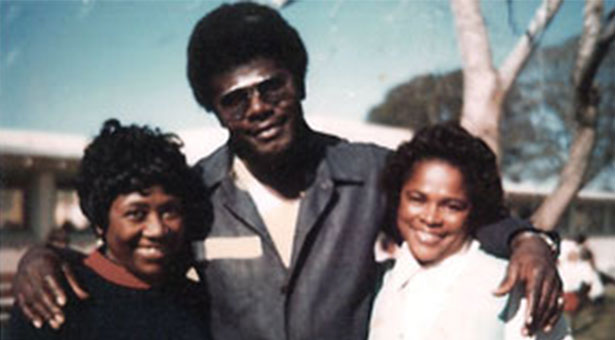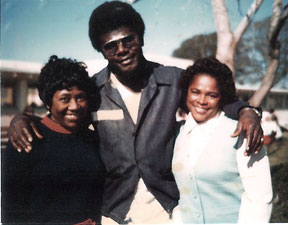
 Former “American Gangster” Earl Lloyd’s journey from a life of crime to finding God and ultimately experiencing redemption
Former “American Gangster” Earl Lloyd’s journey from a life of crime to finding God and ultimately experiencing redemption
Earl Lloyd spent the majority of his life behind bars before he discovered the acceptance that a crime filled life could not provide as he learned how God could turn a menace to society into an apostle who preached a gospel of hope to others who had also chosen crime as a way of life. Lloyd is shown with his mother Marie Lloyd and his grandmother Sheryl Walker during a prison visit.
By Charles Moseley
(Part I of a II Part series)
To say that Earl J. Lloyd has led an unusual life would be an understatement and not begin to tell the story of one man’s journey in life, a journey which began 75 years ago, in the rural community of Fayetteville, N.C. From that point up until this day, Lloyd has traveled down a road filled with circumstances the likes of which novels have been written and depicted on the silver screen.
Upon closer examination, Lloyd’s life was fairly uneventful early on. His father, Henry J. Lloyd, was a successful business man who owned Lloyd’s Dinette. He and his wife, Marie had five sons. Earl recalled what life was like living in the South for Blacks where even at an early age, the vestiges of post reconstruction were alive and well. He described Fayetteville as, “a racist town”, a town where slaves were once sold at the market house right in the middle of the town on Hayes St.
“There were things that I experienced at an early age that let me know that the playing field wasn’t equal. Even as a little boy being deprived of things other kids would enjoy that were white because my daddy was always very protective of his family,” recalled Lloyd.
Lloyd said he never saw his father wear overalls or khakis. His father was a well respected business man who belonged to the local Prince Hall Masonic Lodge. Years later, his son Earl also would become a Mason. All of those things left an impression on Earl and his brothers who experienced a religious up-bringing, and were forced to at-tend church by their grand-father. The family instilled in them to do the right thing like going to school and getting their education.
Lloyd and his brothers walked five miles a day to school, yet were still expected to help out the family in the only way they knew how in the early years.
“I was strong at an early age because we had to work the fields,” said Lloyd, eluding to the fact that many Blacks were required to help support their families at an early age doing migrant work.
His parents divorced when he was 14, a fact which he said contributed to him turning to a life of crime at an early age.
“When my mother and father separated and we were with our grandmother Sheryl Walker, it was then. We didn’t have any structure. My life just didn’t have any structure to it.”
When young 11-year-old Earl moved to Fort Lauderdale he had already begun looking for acceptance on the streets where he found a liking for the allure and excitement that was part of the criminal element in the community. He said he brought his problems with him.
By the time he became a teenager he had already dropped out of school in the seventh grade and he was involved with older guys who committed crimes which got him in the life he felt offered the excitement he was looking for.
“I sought out people who were just as aggressive as I was. Crime seemed to be the answer,” he concluded. He was sent to Marianna, Fla. to reform school at 14. There were 20-year-old guys there.”
“I ruled a notorious gang known as The Greenside. I was also on top of the River Rats Gang,” which according to him was due to “a bowlegged girl I liked who was involved in gang activities.”
Before long Lloyd had developed quite a name for himself on the streets of Broward County. As time wore on young Lloyd discovered at the time that he “could do something better than most people-control others through fear in the criminal world. He was hired as a body guard for members of the syndicate including the likes of Pokey Baines, the head of the Irish Syndicate gang. “I was sought because I was an expert marksman, I was a fighter. I always felt that a man could never defeat me.”
Little did he know what a price he would ultimately have to pay for making that decision to lead the life of a gangster and the toll he would pay. He continued a life of crime as a gang leader in South Florida and later in New York, where he fled as a fugitive of justice for a robbery which resulted in a murder charge.
It was then he said that he “realized how precious life was and what it meant to be free. Everybody thought when I would take control of a major drug area and I would see it my name on the street was Tommy Sands, or TT which stood for Terrible Tommy.” He ran his drug organizations with an iron fist. At the height of his criminal career he had money and all the things that go with it – fancy cars, fine women but he said he would give it all up just to be free. “I was still being sought.” He was 25 when he fled to New York.
First he fled to Queens in Long Island, N.Y. but he said it was “too laid back, too quiet. I said ‘no I’ve got to get in the jungle’.” That prompted his relocating to the Bronx, N.Y. in an area known as Fort Apache. He quickly established himself after he knocked out a local gang leader.
To maintain order amongst the gang members he controlled required being the most violent of the violent. He was constantly on the lookout to protect his turf from intrusion from other rival gangs. When he was threatened by another gang leader he said, “I would always step forward. I demanded respect,” the code that gang members new had to be guarded of-ten with their lives.


Be the first to comment